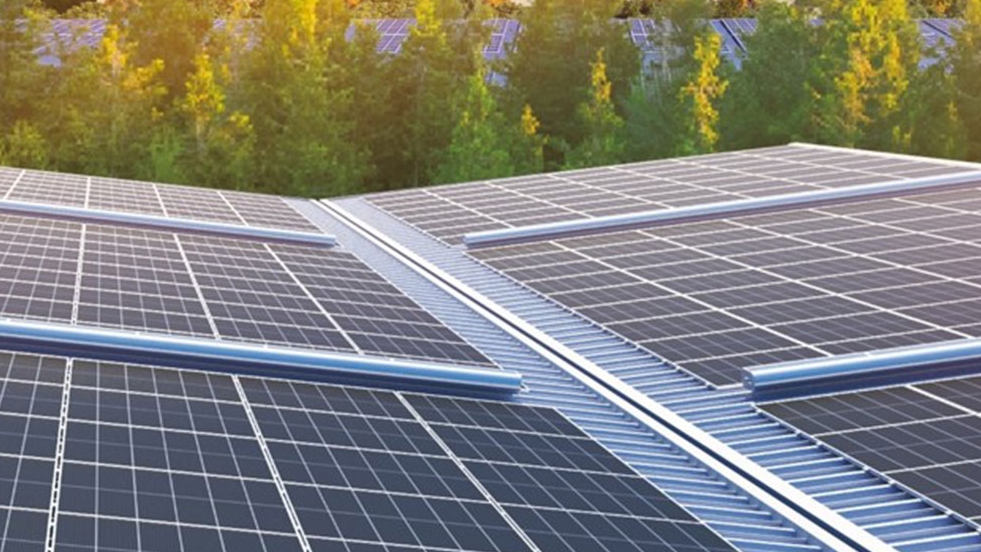聚焦太陽能光伏發電:技術、應用及趨勢
太陽能光伏發電,是一種利用太陽電池半導體材料的光伏效應,將太陽光輻射能直接轉換為電能的新型發電系統,有獨立運行和并網運行兩種方式。如今,隨著技術的不斷進步,其在能源結構中的占比持續提升,成為可再生能源領域的重要組成部分。
Solar photovoltaic power generation is a new type of power generation system that utilizes the photovoltaic effect of semiconductor materials in solar cells to directly convert solar radiation into electrical energy. It has two modes of operation: independent operation and grid connected operation. Nowadays, with the continuous advancement of technology, its proportion in the energy structure continues to increase, becoming an important component of the renewable energy field.
原理方面,光伏發電是利用半導體界面的光生伏特效應將光能直接轉變為電能的技術。關鍵元件太陽能電池經過串聯封裝可形成大面積組件,配合功率控制器等部件構成發電裝置。具體而言,半導體的光電效應是核心:光子照射金屬時,電子吸收足夠能量后逃逸成為光電子;純硅中摻入不同元素形成 N 型和 P 型半導體,兩者結合的接觸面形成電勢差,太陽光照射 P-N 結后,空穴與電子定向移動形成電流。這一過程既是光能量到電能量的轉化,也是電壓形成的過程。
In terms of principle, photovoltaic power generation is a technology that utilizes the photovoltaic effect of semiconductor interfaces to directly convert light energy into electrical energy. The key component solar cells can be packaged in series to form large-area modules, which can be combined with power controllers and other components to form a power generation device. Specifically, the photoelectric effect of semiconductors is the core: when photons irradiate metals, electrons absorb enough energy and escape to become photoelectrons; Different elements are doped into pure silicon to form N-type and P-type semiconductors, and the contact surface between the two forms a potential difference. After sunlight shines on the P-N junction, holes and electrons move in a directional manner to form a current. This process is both the conversion of light energy to electrical energy and the formation of voltage.
從能源屬性看,太陽能指太陽光的輻射能量,是地球多種能量的源頭,如風能、化學能、水的勢能等。人類對太陽能的利用古已有之,從依靠陽光曬干物件、保存食物,到化石燃料減少后對其進行深度開發,其利用方式已從被動式的光熱轉換(如太陽能熱水器)拓展到主動的光電轉換。
From the perspective of energy properties, solar energy refers to the radiant energy of sunlight and is the source of various forms of energy on Earth, such as wind energy, chemical energy, and the potential energy of water. The utilization of solar energy by humans has existed for a long time, from relying on sunlight to dry objects and preserve food, to deeply developing it after the reduction of fossil fuels. Its utilization has expanded from passive photothermal conversion (such as solar water heaters) to active photovoltaic conversion.

當下,太陽能的利用方法更為豐富且高效。除了傳統的太陽能電池發電、熱水加熱及利用熱水發電外,還在多個領域實現突破:在海水淡化領域,太陽能驅動的淡化技術降低了對傳統能源的依賴,適用于缺水地區;太空太陽能的研究雖處于探索階段,但相關的電能儲存與地面接收技術不斷完善,為大規模能源獲取提供了新方向。
At present, the utilization methods of solar energy are more diverse and efficient. In addition to traditional solar cell power generation, hot water heating, and the use of hot water for power generation, breakthroughs have also been made in multiple fields: in the field of seawater desalination, solar powered desalination technology reduces dependence on traditional energy sources and is suitable for water scarce areas; Although the research on space solar energy is still in the exploratory stage, the related energy storage and ground receiving technologies are constantly improving, providing new directions for large-scale energy acquisition.
在應用場景上,移動式和固定式太陽能利用網根據日照條件靈活布局,適應性更強。交通領域,太陽能汽車、船舶等的研發持續推進,續航能力和穩定性逐步提升;公共設施中,太陽能路燈、紅綠燈等已廣泛普及,降低了運維成本;建筑整合太陽能成為趨勢,房屋、廠房等通過光伏幕墻、屋頂光伏板實現能源自給,部分還能向電網反向輸電。此外,小型太陽能裝置如便攜式充電器、戶外照明設備等,憑借便捷性走進日常生活,滿足多樣化的用電需求。
In terms of application scenarios, mobile and fixed solar energy utilization networks can be flexibly arranged according to sunlight conditions, with stronger adaptability. In the field of transportation, the research and development of solar powered vehicles, ships, etc. continues to advance, and their endurance and stability are gradually improving; In public facilities, solar street lights, traffic lights, etc. have been widely popularized, reducing operation and maintenance costs; Integrating solar energy into buildings has become a trend, with buildings, factories, etc. achieving energy self-sufficiency through photovoltaic curtain walls and rooftop photovoltaic panels, and some can even transmit electricity in reverse to the grid. In addition, small solar energy devices such as portable chargers and outdoor lighting equipment have entered daily life with convenience, meeting diverse electricity needs.
技術層面,光伏電池的轉換效率不斷提高,鈣鈦礦電池等新型材料的研發為提升性能、降低成本帶來可能。同時,儲能技術的發展解決了光伏發電的間歇性問題,使電力供應更穩定。在政策支持與環保需求的推動下,太陽能光伏發電正朝著更智能、更普惠的方向發展,為全球能源轉型提供有力支撐。
On a technical level, the conversion efficiency of photovoltaic cells continues to improve, and the development of new materials such as perovskite cells has the potential to enhance performance and reduce costs. At the same time, the development of energy storage technology has solved the intermittent problem of photovoltaic power generation, making power supply more stable. Driven by policy support and environmental protection needs, solar photovoltaic power generation is developing towards a more intelligent and inclusive direction, providing strong support for the global energy transition.
本文由太陽能光伏發電情奉獻.更多有關的知識請點擊:http://m.51dwgw.cn我們將會對您提出的疑問進行詳細的解答,歡迎您登錄網站留言.
This article is a friendly contribution from distributed photovoltaic power generation For more information, please click: http://m.51dwgw.cn We will provide detailed answers to your questions. You are welcome to log in to our website and leave a message
新聞推薦
product recommendation聯系方式
Contact Information

 TEL:0531-82390078
TEL:0531-82390078 TEL:18805312017
TEL:18805312017 MAI:sdzdny001@163.com
MAI:sdzdny001@163.com 公司地址: 濟南市歷下區山大路157號
公司地址: 濟南市歷下區山大路157號 天合藍天·山東種電
天合藍天·山東種電 備案號:魯ICP備17052940號-2
魯公網安備37010202700164號
備案號:魯ICP備17052940號-2
魯公網安備37010202700164號
 網站地圖|XML|TXT
網站地圖|XML|TXT

掃一掃方便咨詢我們

截屏,微信識別二維碼
微信號:18805312017